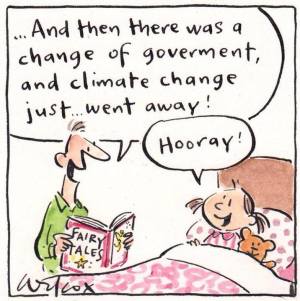The Australian Government made heaps of policies in 1960’s. Thousands of them. Maybe tens of thousands. But they never made a 1960’s policy in the 21st century. Until now. In the first day of the new 44th Parliament of Australia, they undid a lot of tough work done over the last 15 years and have set Australia on a crash course for 1967. That’s fine if you’re looking at driving a Mustang down the highway, but not if you’re leading a highly developed nation into the middle half of the 2000’s. We need to be leaders. Visionaries. We need to show that it can be done. Unfortunately that’s not going to happen any time soon.
Let’s recap what transpired yesterday:
- Carbon tax repealed
- Australian Renewable Energy Agency funding cut by 15% ($435M) until 2022
- Deferral of an extra $370M for AREA until after 2020
- Repeal of $10B Clean Energy Finance Corporation
- Unlikely increase of 5per cent emissions reduction by 2020
- Review of the renewable energy target of 20 per cent of all electricity generation by 2020
And the details.
10:25am: Finally, Prime Minister Tony Abbott gets his chance to speak on the first of the carbon tax repeal bills.
Official title: Clean Energy Legislation (Carbon Tax Repeal) Bill 2013.
The new government cannot undo the past, we can only make the future better, Mr Abbott says.
The introduction of the bill can be read here:
http://www.pm.gov.au/media/2013-11-13/introduction-clean-energy-legislation-carbon-tax-repeal-bill-2013
And here is the actual bill itself:
http://www.environment.gov.au/carbon-tax-repeal/pubs/clean-energy.pdf
Details of the carbon tax repeal legislation reveals the $3 billion of funding to the Australian Renewable Energy Agency (ARENA) will be cut by $435 million. ARENA was set up to fund renewable energy projects and research, and helped to finance projects such as solar and wave energy. At a time when Australia needs to be the world leader in sustainable energy production, the Federal Government is confining us to the back of the pack. An astounding decision considering our vast supply of these natural renewable assets.
Much of these policies were brought to the September election, and so already public knowledge. Yesterday was just a confirmation of it. The really interesting comments surrounded “binding”, “conditional”, and “aspirational” commitments to Australia’s emissions reductions.
Mr Abbott:
We will meet our 5 per cent emissions reduction target but this government has made no commitments to go further than that and we certainly want to get emissions down as far as we reasonably can.
But we are certainly in no way looking to make further binding commitments in the absence of very serious like-binding commitments in other countries and there’s no evidence of that.
We have made one commitment and one commitment only, which is to reduce our emissions by 5 per cent.
And here is where the problem lies. Since May 2009, the Coalition has supported the former Labor government’s commitments to the UN that it would continue reductions beyond 5 per cent below 2000 levels should a number of conditions be met. As other countries made progress towards reducing their levels, then higher targets would kick in to Australian levels. Specific markers to increase the target were set down by Labor, but the word “binding” was not included. In fact, the test was that other countries take comparable action as part of global climate action. In December 2009, Abbott wrote to Prime Minister Rudd stating his support for the target range and the conditions set.
The Climate Change Authority declared the five per cent target was “inadequate” and should be increased to 15 or 25 per cent, in part because the scale and pace of international action warrants an increase.
Taken as a whole, the government’s own conditions for moving beyond five per cent appear to have been met. More broadly, a five per cent target would put Australia at the lower end of effort compared with other developed countries.
Independent experts now say those 2009 conditions have been met for a strengthening of the 2020 target. Professor Ross Garnaut also says the progress the US and China have made on their emissions targets means Australia should adopt a cut of about 17 per cent by 2020.
Furthermore, Mr Abbott’s unequivocal support for the 5 per cent target now contrasts with his position during the election campaign, when he said he would not pour more money into its Direct Action climate change policy should the emissions target become elusive.
We accept that climate change happens, that mankind, humanity, make a contribution to it and it’s important that we take strong and effective action against it, Mr Abbott said.
Really? I wouldn’t correlate strong and effective action with a percentage number of FIVE.

